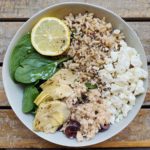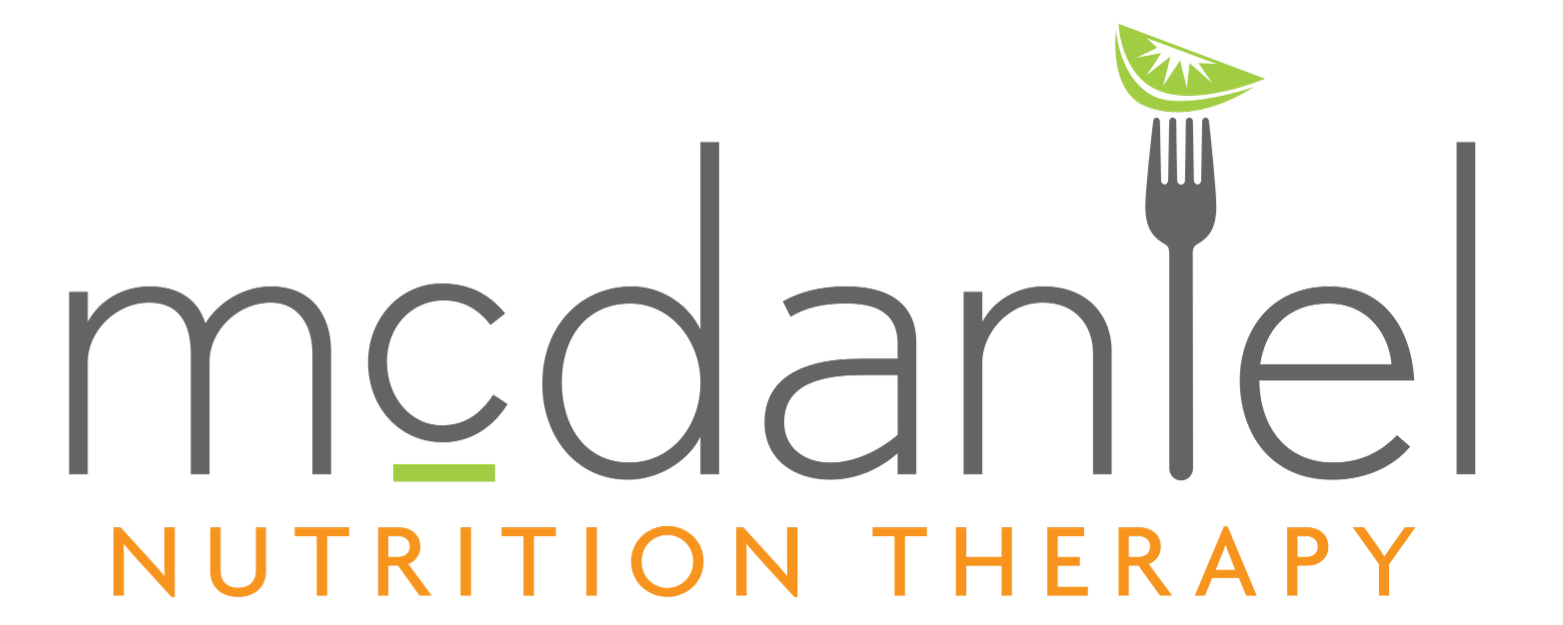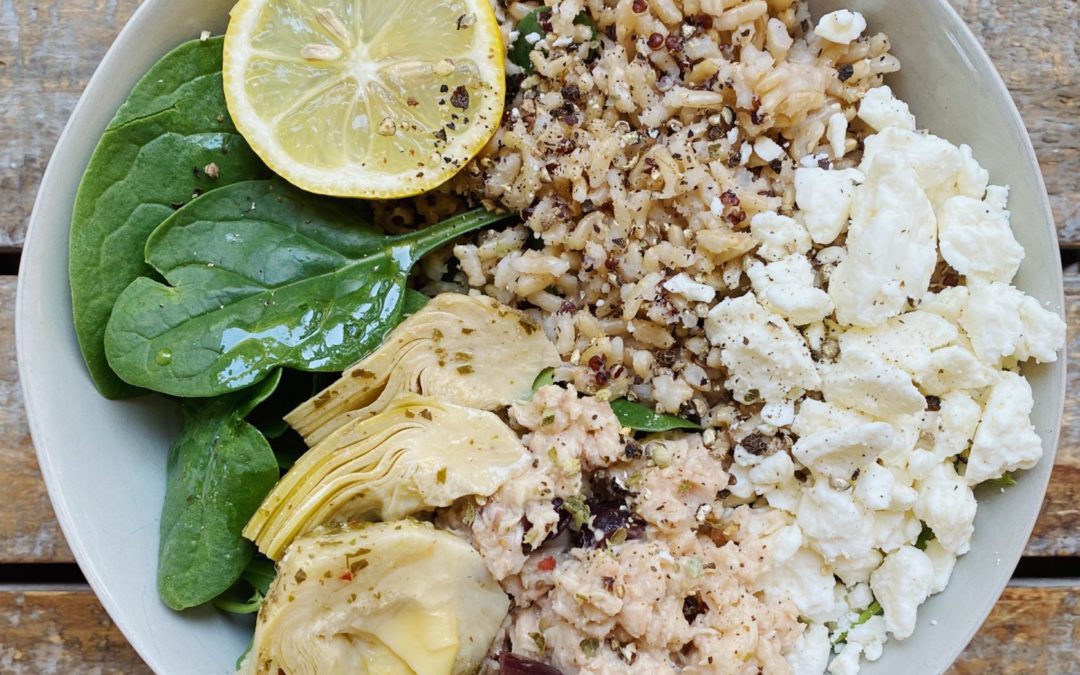If I’m being honest, I’m nervous about my fall and winter immune system. As you all know, it’s not just cold and flu season, we’ve got a doozy additional virus to deal with. So, we’ve dug into the research, and we’re bringing you, what we feel are the top 5 strategies to support your fall and winter immune system. Plus…a delicious Mediterranean Salmon Power Bowl to boot.
For an audio summary, check out Jennifer’s conversation on the Big 550 KTRS

How We Eat
While no “one” food can support your immune system, the key with diet is an inclusion of whole, plant-based foods providing a variety of nutrients.
Since the majority of immune-modulating nutrients are found in our gut – supporting gut-health is key. A gut-healthy diet includes fruits, vegetables, whole-grains and healthy fats. Think…the Mediterranean Diet way to eating which includes a wide array of antioxidants, fiber and anti-inflammatory fats.
How We Supplement: Vitamin D
Vitamin D is a crucial vitamin when it comes to immunity support, and we don’t get enough. Up to 70% of people are “D” deficient. Low levels of vitamin D are associated with an increased risk of infection and disease (1). For example, a recently published a study found that a sufficient amount of vitamin D can reduce the risk of catching coronavirus by 54%. Foods rich in vitamin D include salmon (see recipe below), egg yolks, UV-exposed mushrooms, but most of us do not meet our vitamin D need from a food alone. Get your vitamin D levels checked (Goal: 40-70 ng/dl). And, if approved by your dietitian or physician, take a safe, evidence-based dose is around 2,000-4,000 IU of Vitamin D3 per day (2).
How We Sleep
Sleep is the most underrated factor in supporting our health and immunity. American’s aren’t great sleepers, and it’s worsened with the stress and impact of COVID-19. A recent study found that people getting six hours or less per night are FOUR times more likely to catch a cold when exposed to COVID-19, compared to those who spend more than seven hours a night in slumber land.
If we’re under the weather or have been exposed to a virus, we need sleep to fight it off. During sleep, our immune system releases certain immune supporting cytokines which increase with infection to combat illness. If the body is deprived of sleep, it may actually decrease production of these protective cytokines and infection-fighting antibodies.
Check out our post: 12 Steps for A Better Sleep Routine
How We Manage Stress
Daily stress causes our body to produce the stress hormone, cortisol. While acute stress is anti-inflammatory, chronic stress and elevated cortisol levels breaks down our body’s protective immunity and increases risk of illness. In addition, stress decreases the body’s lymphocytes — the white blood cells that help fight off infection. The lower your lymphocyte level, the more at risk you are for viruses, including the common cold and cold sores.
While I’m a fan of daily meditation, what managing activities best serve you? Find it and practice it daily.
Exercise
Studies show that regular exercise of moderate to vigorous-intensity improve our immune in several ways: improving our responses to vaccination, lowering inflammation, and releasing proteins that assist with immunity. A
s exercise causes our heart to circulate the blood through our body, this action also mobilizes billions of immune cells, especially cells responsible for recognizing and killing virus-infected cells.
Fall and Winter Immune Support Will Require Intentionality
Let’s be honest, each one of these fall and winter support strategies means you’ll have to trade off…an extra show of Netflix at night so you get your sleep, have energy to exercise the next day. Choosing tea over that glass of wine to deal with stress in a healthier way. Inclusion of more plants requires meal planning. So, take it one step at a time – your physical and mental health will thank you 10 x over.
Print
Mediterranean Salmon Bowl
- Prep Time: 15
- Total Time: 15
- Yield: 4 1x
- Category: salad
- Cuisine: Mediterranean
Ingredients
- 3, 2.5 oz wild-caught pink salmon pouches
- Juice from one lemon
- 1 T. olive oil
- 1/2 c. sliced kalamata olives
- 8.8 oz package – ALDI 90 second quinoa & brown rice*
- 6 oz. jarred marinated artichoke hearts, drained
- 4 oz. feta cheese
- 8 c. spinach
Instructions
- In a medium-sized bowl, combine salmon, lemon juice and olive oil. Toss in kalamata olives.
- Build individual salads by combining 2 cups of spinach for the base, ~2 oz or 1 cup quinoa/brown rice, 3-4 marinated artichoke hearts, 1 oz. feta cheese and 1/4 of the salmon mixture.
Notes
*Any precooked, packaged rice will do, such as Uncle Ben’s Ready Rice.
Nutrition
- Serving Size: 1 Salad
- Calories: 435
- Sugar: 4 g
- Sodium: 420.7 mg
- Fat: 19.1 g
- Saturated Fat: 7.4 g
- Carbohydrates: 46.7 g
- Fiber: 3.7 g
- Protein: 21 g

